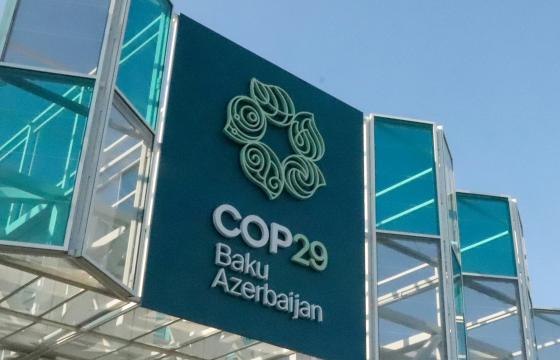
In his latest blog, Jason Murphy, our Managing Director for Global Retail, explores how technology is transforming sustainability, shifting it from a regulatory obligation to a powerful business advantage.
Energy efficiency and decarbonisation are front of mind following COP29, which brought nearly 200 countries together to shape and define the global approach to climate action. These high-level discussions set the tone for policies that ripple through economies, influencing large corporations, small and medium-sized businesses (SMBs), and individuals alike.
At this year’s COP, businesses took centre stage, recognised as critical players in the fight against the climate crisis as they continually deliver practical, scalable solutions to complex challenges.
With the advancement of technology, specifically IoT, the path to sustainability has transformed and is no longer an optional add-on for businesses. Energy reductions and cost savings now go hand in hand, making sustainability not just a moral responsibility but a business imperative, and a core strategy for resilience and long-term growth.
From Obligation to Opportunity
Colloquially coined the ‘Finance COP’, COP29 put a spotlight on a critical yet contentious question: can the world afford to make cleaner choices? For businesses, this question often translates to whether sustainability is a cost to bear or an investment worth making.
Historically, businesses have seen sustainability initiatives as a compliance requirement – an obligation enforced by regulation or market pressure. However, as technologies like IoT advance and become more accessible, this narrative is shifting. Today, sustainable practices are increasingly viewed as pathways to operational efficiency, competitive advantage, and financial growth.
COP29 has reinforced the urgency of aligning business investment strategies with climate goals. For organisations, this isn’t just a chance to comply – it’s a unique opportunity to lead the way by aligning investment strategies with climate goals, essentially reshaping growth models to drive profitability while contributing to global climate action.
Real-Time Insights for Sustainable Growth and Cost Savings
Businesses now have the opportunity to integrate cutting-edge IoT technology into their operations, unlocking improvements in energy efficiency, cost savings, and rapid ROI.
For example, IMS Evolve’s IoT solution connects to mission-critical equipment, such as fridges, freezers, lighting and HVAC system, to harness previously untapped data.
By monitoring and managing everything from machine performance, health, and energy usage, organisations can unlock unprecedented insights and drive real-time actions to improve operations, optimise efficiency, reduce energy consumption, and lower overhead costs, all while significantly shrinking their carbon footprint. This capability will prove particularly critical during the winter months when rising energy costs place increased pressure on operational budgets.
Furthermore, our IoT solution takes sustainability and cost efficiency a step further by enabling automatic interventions when equipment operates outside ideal conditions. Real-time monitoring ensures that deviations – such as excessive energy use, temperature fluctuations, or irregular defrost cycles – are identified and addressed instantly. This proactive, technology-driven approach not only prevents costly failures, waste, and excessive energy consumption but also minimises the need for manual intervention, freeing up resources for other priorities.
In the context of COP29’s emphasis on decarbonisation, energy efficiency, and financials, these capabilities are crucial. By embedding IoT solutions into their operations, businesses can align their actions with global climate goals while simultaneously cutting costs and building resilience. IoT doesn’t just monitor systems – it actively empowers businesses to make smarter, faster, and greener decisions that drive meaningful progress toward sustainability.
Affordable and Accessible Innovation
Traditionally, a barrier to the uptake of digital technology has been the prohibitive costs of buying new equipment and the downtime associated with replacing machines with new upgraded systems. The IMS solution removes these obstacles with a controls-agnostic approach, allowing businesses to digitally upgrade existing infrastructure without costly overhauls.
With seamless integration to a huge variety of devices and assets, regardless of make, model, or age, agnostic solutions can collect data and optimise any connected device without the need for expensive hardware replacements or upgrades to the latest smart assets. This ‘plug and play’ approach unlocks immediate value release with minimal start-up costs and, therefore, rapid returns on investment.
By combining affordability, accessibility, and impact, these incremental upgrades offer businesses a practical way to reduce emissions, cut costs, and align with the climate goals emphasised at COP29 – whilst improving, not sacrificing, operational efficiency.
Reframing Sustainability
COP29 has drawn attention to a shift already taking place, where businesses recognise that technology can provides sustainable benefits as well as measurable finance benefit and tangible business value. Through innovative IoT solutions, carbon reduction and cost efficiency are increasingly being positioned as dual benefits. This evolution means that sustainability is being reframed from a regulatory requirement to a powerful business strategy, driving strategic advantage and positioning organisations for impactful long-term growth while meeting global climate goals.
For more insights into the intersection of technology and sustainability, take a look at my previous blogs on the implications of COP28 and the JasON COP27 podcast series.